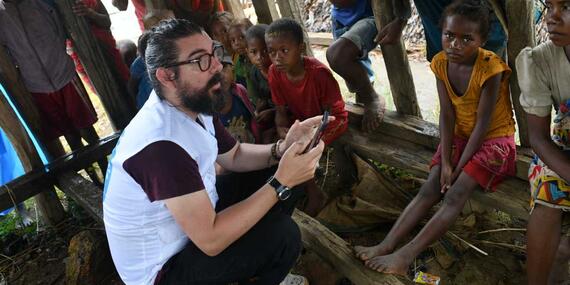Today's top news: Tropical Cyclone Freddy, Türkiye, Syria, Ukraine

Tropical Cyclone Freddy
The devastation wrought by the Tropical Cyclone Freddy continues to rise.
In Malawi, authorities report that more 500,000 people have been affected, including at least 326 killed and more than 180,000 displaced.
Search and rescue operations continue, and, yesterday alone, 442 people were rescued, according to the Government.
As flood waters begin to subside, Government-led relief efforts are expanding and focusing on reaching displaced people.
In Chikwawa, one of the districts with the highest number of displaced people, the World Food Programme and its partners have distributed super cereal, a blend of corn and soy, to all displacement sites and similar efforts are underway in other districts.
However, some areas remain cut off due to the extremely challenging conditions on the ground. Aid workers are mobilizing air transport and boats to transport supplies and search and rescue efforts in locations that can’t be accessed by road.
Humanitarian partners are concerned by the risk of cholera spreading in flood-affected areas, especially in crowded displacement sites. UNICEF and its partners are working to clean latrines in schools serving as shelters in Blantyre and will also install water storage bladders to provide safe drinking water.
In Mozambique, the number of affected people by Freddy’s second landfall also continues to rise, reaching 340,000. In total with the cumulative impact of the floods, and the two landfalls, more than 510,000 people have been affected across the country.
The UN team has a presence in each affecting provinces and we are working closely with the authorities to provide aid to over 49,000 people displaced and to access areas isolated by floods.
Cholera is also spreading, and there are not enough water disinfection supplies to support containment activities to control the outbreak.
Yesterday’s allocation of $10 million by the Central Emergency Response Fund will help address some of the gaps in the response to cholera, floods and cyclone Freddy. However, more funding is urgently needed to contain the cholera outbreak and to sustain relief operations.
Humanitarian partners are finalizing a flash appeal – as an addition to this year’s overall appeal – to address the most urgent humanitarian needs resulting from the convergence of Freddy, floods and cholera.
Türkiye
So far, flash flooding has claimed 18 lives in the cities of Adiyaman and Sanliurfa, according to the Government. The floodwaters inundated camps housing people displaced by last month’s earthquakes. Authorities say some 220,000 people are living in tents in and around Adiyaman.
As of yesterday, some 2.3 million people are sheltering in temporary settlements – with 1.6 million of them in informal sites. Many camps lack access to clean water, sanitation and hygiene facilities, and overcrowding is a major concern.
Access to education is also a problem for nearly 4 million children, of whom 350,000 are refugees and migrants. We and our partners have set up 87 temporary learning sites for more than 6,000 children in Gaziantep, Hatay and Kahramanmaras.
UN agencies and our partners have reached more than 520,000 people with water, sanitation, and hygiene assistance. About 45,000 people have received health and nutrition assistance. The World Food Programme has provided more than 6 million food packages and hot meals.
Meanwhile, UN Disaster Assessment and Coordination teams continue to work with Turkish authorities on humanitarian relief efforts in Adiyaman, Hatay, Kahramanmaras, and Malatya.
Funding is urgently needed to help more than 5 million people affected by the earthquakes. The flash appeal for $1 billion is just over 16 percent funded.
Syria
OCHA and its partners continue to scale up their efforts to help millions of people affected by the earthquakes.
The flash appeal for $400 million is now 72 percent funded.
In northwest Syria, more than 103,000 people have been internally displaced since 6 February.
As of today, nearly 900 trucks carrying aid from seven UN agencies have crossed into the northwest from southern Türkiye, through the three available border crossings.
In the past 10 days, more than 1.3 million people in northwest Syria have been vaccinated against cholera. That response is being led by WHO and UNICEF.
Nearly 200,000 people in Idlib and Aleppo received multi-purpose cash assistance last month, totaling $6.4 million.
Ukraine
Today, another humanitarian convoy reached the front-line community of Beryslav in the southern region of Kherson.
The convoy was carrying food, clothing, blankets, medical kits, solar lamps, jerry cans, electric heaters, and hygiene supplies for nearly 6,000 residents, including over 520 children and as many as 400 people with disabilities.
That aid was provided by IOM, WFP, WHO and the international NGO HEKS EPER, Swiss Church Aid.
Beryslav is exposed to regular shelling, which has reportedly caused extensive damage to homes and civilian infrastructure. An estimated quarter of residential buildings there has been damaged or destroyed.
The community has no gas supply, and water supplies have been interrupted in some locations.
Mine contamination has prevented residents from cultivating their land. Because agriculture is one of the main livelihoods for people there, the community now depends on humanitarian assistance.
Residents urgently need clothes, food, shelter materials, access to water and sanitation, and other basic supplies and services.
So far this year, the UN has sent four humanitarian convoys to the Kherson region to support some 15,000 residents in the most affected communities.
